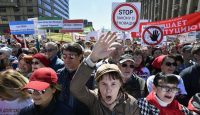
Adiós, Rusia
Ya pasó un año desde que Rusia, el lugar donde nací, invadió Ucrania. Llevamos 365 días despertando con noticias de misiles rusos, bombardeos, asesinatos, torturas y violaciones. Han sido 365 días de vergüenza y confusión, de no querer mirar pero necesitar saber lo que pasa, de ver a los rusos convertirse en «ruscistas», «orcos» o «putinoides». En estos 365 días, el calificativo de «rusoestadounidense», que antes no generaba complicaciones, se ha sentido como una contradicción en sus propios términos.
Quienes estamos en esta situación hemos tenido métodos para adaptarnos a las nuevas circunstancias, algunos más fáciles que otros. Mi biblioteca sigue llena de libros rusos, pero ya no tengo ningún deseo de releerlos.… Seguir leyendo »










